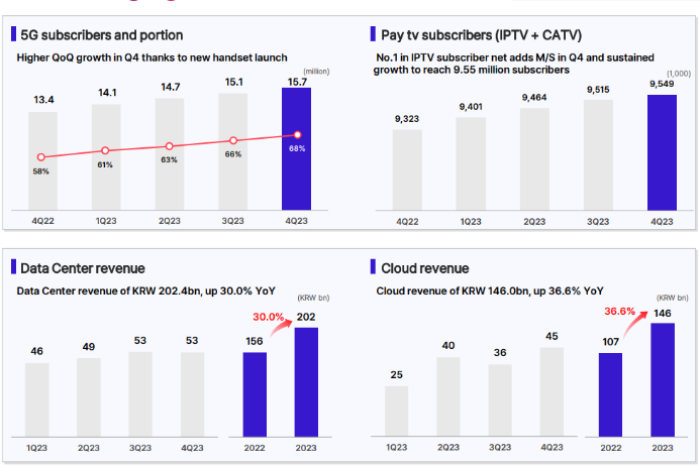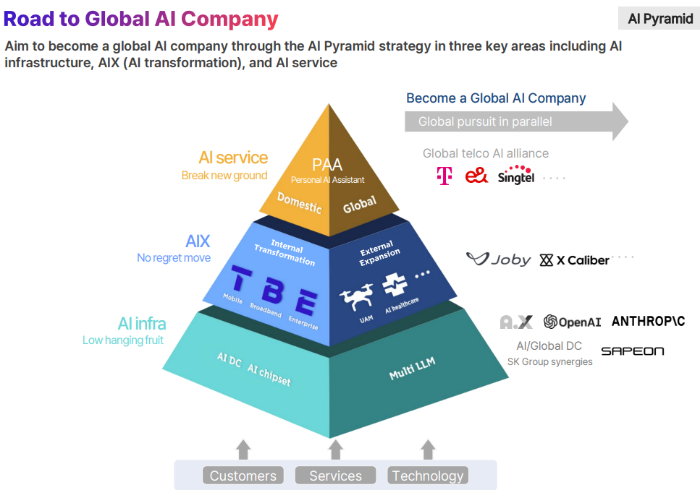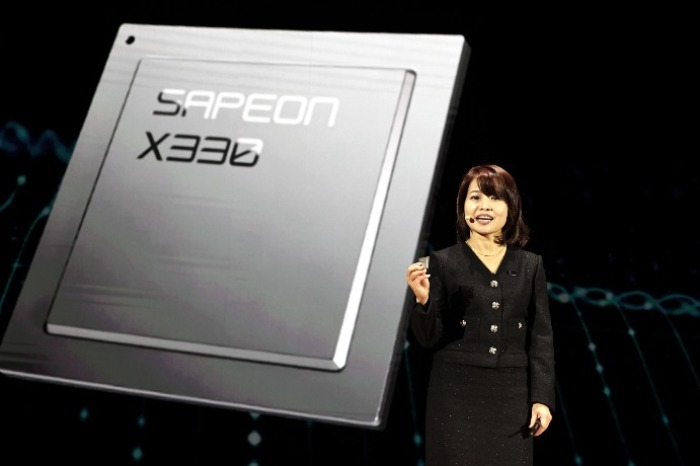Earnings
SK Telecom gears up for AI leap in 2024
S.Korea’s No. 1 mobile carrier’s operating profit in 2023 increased nearly 10% on-year largely thanks to robust AI businesses
By Feb 05, 2024 (Gmt+09:00)
4
Min read
Most Read
LG Chem to sell water filter business to Glenwood PE for $692 million


KT&G eyes overseas M&A after rejecting activist fund's offer


Kyobo Life poised to buy Japan’s SBI Group-owned savings bank


StockX in merger talks with Naver’s online reseller Kream


Meritz backs half of ex-manager’s $210 mn hedge fund



SK Telecom Co., South Korea’s largest mobile carrier, will expedite its transition into an artificial intelligence company this year after its operating profit jumped nearly 10% last year from the previous year on robust AI business growth.
The company reported 1.75 trillion won ($1.3 billion) in consolidated operating profit for 2023, up 8.8% from 2022. Over the same period, net income and revenue added 20.9% to 1.15 trillion won and 1.8% to 17.61 trillion won, respectively.
While recording steady growth in its mainstay mobile and internet protocol TV businesses, SK Telecom enjoyed handsome profit growth across its AI businesses, its new growth driver, the company said.
Backed by the upbeat results, the telecom giant will further accelerate its transformation into an AI service company this year.
“We will actively incorporate AI to offer the most optimized services and efficient and high-quality customer service to our services so we can improve productivity and profitability through enhanced customer experiences,” Kim Yang-sup, the chief financial officer of SK Telecom, said during a conference call after the earnings report.
The company expects its AI data center, AI enterprise and AI semiconductor businesses to drive the company’s overall AI business growth on strong demand this year.

But it expects this year would be somewhat challenging for its traditional mainstay telco business on an anticipated slowdown in 5G and wireless subscription growth, said Kim, adding that the company will seek other means besides increasing subscribers to foster wireless business growth this year.
SK Telecom posted 297.1 billion won in consolidated operating profit in the fourth quarter ended in December 2023, up 16.7% from the same period a year earlier on revenue of 4.5 trillion won, up 3.0%.
The company is targeting 17.9 trillion won in consolidated revenue in 2024, up about 2% from last year.
GOING GLOBAL WITH AI SERVICES
Encouraged by its solid AI business results, SK Telecom aims to go global with its AI services this year through partnerships with global telcos and tech companies.
In September last year, the company unveiled the so-called AI Pyramid Strategy as part of its efforts to transform into an AI company. The project is broadly divided into three main areas – AI Infrastructure, AI Transformation (AIX) and AI Service.

In 2023, SK Telecom reaped 202.4 billion won in sales from its data center business, the backbone business of its AI Infrastructure, according to the company. It was a 30% jump from the year earlier.
It plans to add new data centers and set up a specific plan to foray into overseas markets this year.
Its AI semiconductor subsidiary Sapeon rolled out the X330 AI chip for data centers in November and already delivered the chip to its sister company SK Broadband and non-SK customer NHN Cloud Corp.
The company is also in talks with American server provider Super Micro Computer Inc. for AI chip cooperation.
SK Telecom plans to unveil key features of its telco-tailored large language model (LLM) under development in partnerships with Anthropic and OpenAI, in the first half of this year, the company said during the earnings conference call.
Separately, SK Telecom is also co-developing its proprietary LLM with its global alliance group formed in July last year.
Its cloud business, the pillar business of the AIX, posted 146 billion won in revenue last year, up 36.6% from the year prior thanks to a rise in its cloud managed services provider (MSP) subscriptions.

The company last month introduced a business-to-business (B2B) AI platform dubbed Enterprise AI Market and is seeking to introduce new AI businesses such as AI contact centers, vision AI and big data.
It plans to add new features to its personal AI assistant service called A., or A Dot, which has already won more than 3.4 million subscriptions thanks to its ability to record phone conversations in the iPhone series.
It will also expedite the AI transition in its metaverse platform ifland and e-commerce platform T Universe this year.
KOREA’S NO. 1 MOBILE CARRIER
SK Telecom was still Korea's No. 1 mobile carrier in 2023.
Subscribers to its mobile services hit 31.3 million in the fourth quarter, with 15.7 million 5G subscribers, accounting for 68.1% of its total smartphone-holding subscribers.
Its subsidiary SK Broadband reported 309.2 billion won in operating profit in 2023, up 1.1% from the previous year on sales revenue of 4.3 trillion won, up 3%.

Korea’s No. 1 mobile carrier will decide whether to re-list its broadband subsidiary SK Broadband and if so, come up with its detailed initial public offering plan after closely monitoring various factors like market conditions and its potential impact on the company’s value, Kim said when asked about the company’s plan for SK Broadband’s IPO.
SK Broadband was delisted in 2015.
On Friday, SK Telecom’s board of directors approved a plan to pay shareholders an annual dividend of 3,540 won per share last year. The plan is up for approval at the general shareholders meeting in March.
The company has completed its share buyback program worth 300 billion won and retired 200 billion won worth of shares on Monday, said the company.
SK Telecom shares inched up 0.2% to end at 50,400 won on Monday.
Write to Ji-Eun Jeong at jeong@hankyung.com
Sookyung Seo edited this article.
More to Read
-
 Korean innovators at CES 2024SK Telecom considers adding LLM to iPhone recording app
Korean innovators at CES 2024SK Telecom considers adding LLM to iPhone recording appJan 12, 2024 (Gmt+09:00)
2 Min read -
 Artificial intelligenceSK Telecom launches AI-based phone interpreting service
Artificial intelligenceSK Telecom launches AI-based phone interpreting serviceDec 14, 2023 (Gmt+09:00)
1 Min read -

-
 Artificial intelligenceNvidia challenger Sapeon unveils new AI chip for data centers
Artificial intelligenceNvidia challenger Sapeon unveils new AI chip for data centersNov 16, 2023 (Gmt+09:00)
2 Min read -
 EarningsSK Telecom’s Q3 profit up on brisk data center, cloud sales
EarningsSK Telecom’s Q3 profit up on brisk data center, cloud salesNov 08, 2023 (Gmt+09:00)
3 Min read -
 Artificial intelligenceSK Telecom to enter generative AI market with large language model
Artificial intelligenceSK Telecom to enter generative AI market with large language modelAug 23, 2023 (Gmt+09:00)
1 Min read -

Comment 0
LOG IN


